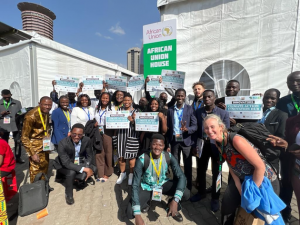African Startups Mull Home-Grown Solutions to Combat Climate Change
 6 September 2023
6 September 2023

Delegates outside the Climate Action Innovation Hub on the frontlines of the Africa Climate Summit. Credit: Aimable Twahirwa
By Aimable Twahirwa
NAIROBI, Sep 6 2023 (IPS)
A group of young African startups made their presence known at the Africa Climate Summit in Nairobi, Kenya, hoping to play a big role in promoting home-grown climate-oriented solutions.
In line with the recently adopted African Union Climate Change and Resilient Development Strategy (2022-2032), experts believe that broad-based ownership and inclusive participation are vital for engaging Africa’s women and young people to showcase their ‘game-changing’ innovations.
According to Dr Yossi Matias, Vice-President of the Google Research initiative, pushing for innovative solutions and research around climate change remains critical for Africa when considering that the continent continues to feel the impacts of global warming in many ways.
“Most solutions promoted by African startups and innovators are in danger of being ignored because of many factors, but there is a way to overcome these challenges,” Yossi told IPS.
Among the solutions put forward by young innovators at the Climate Action Innovation Hub, which took place on the sidelines of the summit, were clean energy, climate-smart agriculture and sustainable land management, biodiversity conservation, water storage and conservation, waste management, and circular economy.
The innovations can also enhance the key cross-cutting areas needed to amplify climate cooperation and action, including climate advocacy, empowerment, awareness raising, capacity building, and climate literacy.
Other key areas of innovation are green transport and climate-resilient infrastructure, resilient, climate-smart cities, digital transformation, and food security.
The latest estimates by the UN agencies show that changing precipitation patterns, rising temperatures, and more extreme weather contributed to mounting food insecurity, poverty, and displacement in Africa.
Official figures show that food insecurity increases by 5–20 percentage points with each flood or drought in sub-Saharan Africa
While African Governments are committed to supporting climate solution innovation to varying levels and with different approaches to tackle this phenomenon, some experts believe that what is needed is to encourage a growing number of African startups to shift in mindset—by becoming providers of solutions to improving the continental climate change resilience.
“What is needed for these young African innovators is to look for mentors and incubators because, as an entrepreneur, you need to learn how to develop a successful product that brings some short-term and long-term positive benefits to combat climate change in your community,” Yossi said.
Through its Accelerator programs, the Google Research initiative currently seeks to empower startups, developers, and nonprofits, especially in Africa, to better solve the world’s biggest challenges — from economic development, diversity, sustainability, and climate change — relying on its technology.
For example, one of the initiatives presented at the summit seeks to produce plastic waste collected from local communities in the Rwandan capital Kigali where a startup is producing handcrafts from plastic waste collected in the city.
Sonia Umulinga, a young Rwandan female entrepreneur and owner of ‘Plastic Craft’, a company that seeks to tackle the problem of plastic pollution, told IPS that key priority had been given not only to help reduce plastic pollution but also to her new business model in using the collected waste to produce unique products on the markets.
Harsen Nyambe Nyambe, Director, Sustainable Environment and Blue Economy, African Union Commission, told delegates that the current situation where the lack of ownership over innovations, coupled with a whole narrative built around imported solutions, constitutes a major challenge for the continent to combat climate change.
“Africa needs to redefine on how to engage of the issue of climate change, and countries need to work together to find possible innovative solutions to the challenges they are facing,” he said.
While some officials and experts cite innovation as an important driver of growth and the fight against hunger and malnutrition, which continue to affect major parts of the African continent, others believe there is a need for these African startup entrepreneurs to test and refine these ideas for the benefit of their community.
Current efforts for Africa’s transformation emphasize switching agriculture from subsistence to commercial, which means producing a surplus for the markets and making agriculture become a business while relying on home-grown innovative ideas.
Prof Lindiwe Sibanda, system Board Chair at the Consultative Group for International Agricultural Research (CGIAR), pointed out that the startup initiative is critical for the African Agriculture sector to expedite the production of food.
“We should not give up because we need these startup home-grown solutions to help small-scale farmers meet their needs,” she told delegates.
However, some small-scale farmers and pastoralists believe that indigenous innovation also constitutes another driver for innovation in African Agricultural systems considering that climate change impacts are stalling progress towards food security on the continent.
Tumal Orto, a livestock breeds farmer from Marsabit County in Northern Kenya, told IPS that weaving indigenous knowledge with scientific research remains critical.
“Small-scale farmers are also innovators in their own ways using local ingenuity in their practices,” he said.
However, most experts at the innovation hub on the sidelines of the Africa Climate Summit (ACS) in Nairobi were unanimous that more productive and resilient solutions to combat climate change in Africa will still require a major shift in the way various resources are managed.
IPS UN Bureau Report
